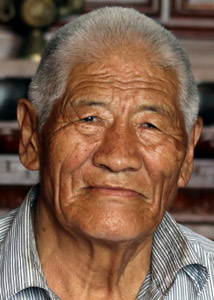Name: Bumdar
(Alias: No)
Gender: Male
Interview Age: 81
Date of Birth: 1934
Birthplace: Zamar, Kham, Tibet
Year Left Tibet: 1967
Profession: Nomad
Monk/Nun: No
Political Prisoner: Yes

Interview No.: 20N
Date: 2015-04-11
Language: Tibetan
Location: Kathmandu, Bagmati, Nepal
Categories: Resistance and Revolution
Keywords: Chinese army -- invasion by , Chushi Gangdrug guerrillas, Cultural Revolution, escape experiences, guerrillas in Mustang, imprisonment, Kham, nomadic life, resistance, thamzing/struggle sessions
Summary:
Bumdar was born in Kham Province and lived a happy life as a nomad. His family reared yaks and sheep that provided them with dairy products, meat and wool. They also travelled each year to gather salt which was bartered for grains. When he was 18 his family embarked on a pilgrimage and when they nearly reached back home after a long journey, they heard the news about the arrival of the Chinese in their village. They decided to settle in Chuktsang but then the Chinese appeared in the region of Ngari in 1954.
Bumdar talks about the policies, programs and tactics used by the Chinese. In 1960 Bumdar's family travelled with many nomads from Kham towards the Nepalese border. He and his father killed a few of the Chinese troops they encountered. Bumdar's father was then killed by the Chinese and Bumdar spent three years in prison in Ngari Gar where many wealthy, leaders and lamas were being held. After confessing his crimes, he was released under strict surveillance by a committee of seven people.
Bumdar recalls the story of his difficult escape to Nepal after the Cultural Revolution was instituted and conditions in Tibet worsened. After passing through Nepal the Indians denied them entry and many Tibetans died from hunger and the heat. Bumdar later joined the resistance operations in Mustang and helped guide the surveillance teams across the Tibetan border.
Interview Team:
- Marcella Adamski (Interviewer)
- Tenzin Yangchen (Interpreter)
- Dhiraj Kafle (Videographer)

